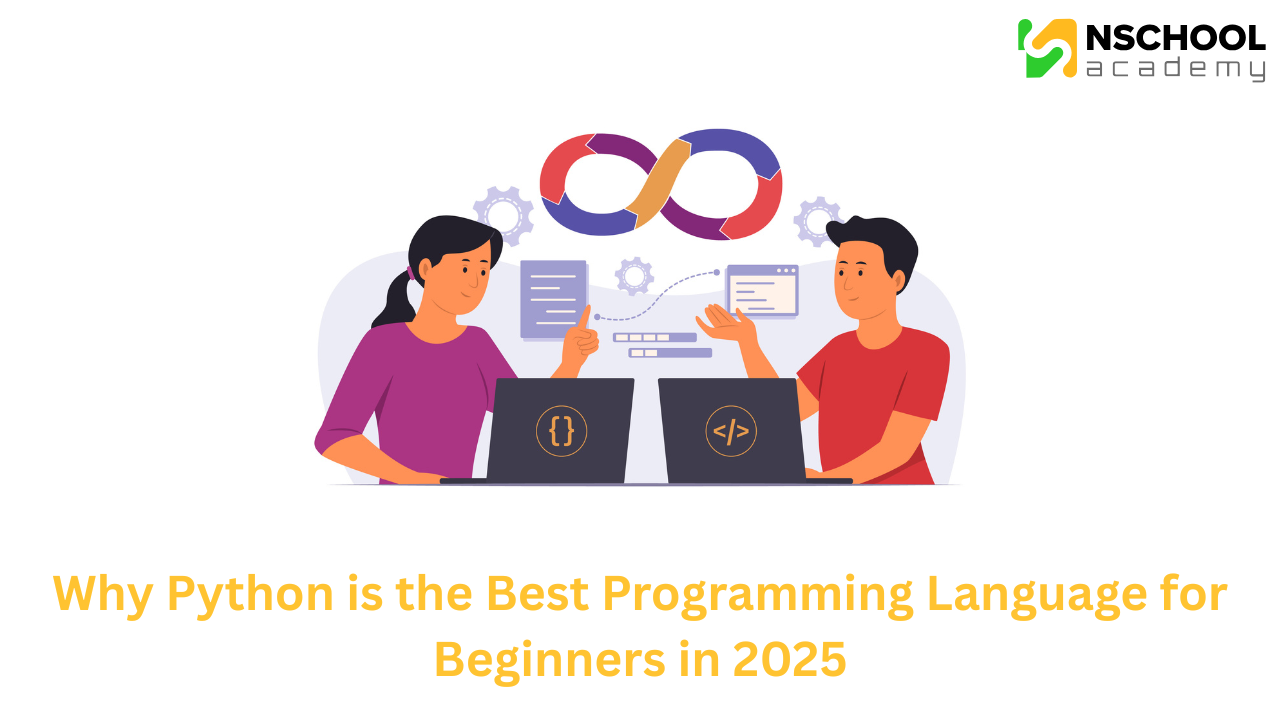Why Python is the Best Programming Language for Beginners in 2025
- September 22, 2025
- nschool
- 0

Why Python is the Best Programming Language for Beginners in 2025
Starting your first programming language can be confusing with so many options available. In 2025, Python is the easiest and most beginner-friendly language to learn. It is also very versatile and widely used for websites, data analysis, artificial intelligence (AI), and more. If you want to start coding and build real-world projects, Python is the perfect choice.
1. Simple and Easy to Learn
The main advantage of Python is its simplicity. Unlike other programming languages with complicated rules, Python uses easy-to-read code that looks like plain English. This makes it much easier for beginners to write, read, and understand their programs.
For example:
print(“Hello, World!”)
That’s all it takes to get started with Python—no extra setup, no confusing symbols. For a beginner, this simplicity builds confidence and reduces the learning curve.
2. Huge Demand in the Job Market
In 2025, Python isn’t just easy to learn—it’s great for building a career. Tech job reports show that Python is one of the top three most in-demand programming languages worldwide. It is used in many industries, including finance, healthcare, e-commerce, education, and entertainment.
For beginners who want to secure a career in technology, starting with Python means opening doors to high-paying roles such as:
- Data Scientist
- AI/ML Engineer
- Web Developer
- Automation Engineer
- Cybersecurity Analyst
3. Versatility Across Domains
Python is known as a “general-purpose programming language,” which means you can use it for almost anything. Beginners can try different areas of technology without learning a new language. Some popular uses of Python include:
- Web Development: With frameworks like Django and Flask
- Data Science & AI: Using libraries like Pandas, NumPy, TensorFlow, and PyTorch
- Automation: Writing scripts to automate daily tasks
- Cybersecurity: Building penetration testing tools
- Game Development: With libraries like Pygame
This versatility ensures that learners don’t hit a dead end—Python grows with their interests.
4. Strong Community and Support
Every beginner faces challenges when learning to code. The good news is Python has one of the biggest and most active programming communities in the world. If you get stuck or want to try advanced projects, you can find plenty of tutorials, forums, documentation, and open-source code to help you.
Platforms like Stack Overflow, GitHub, and Python.org are filled with resources that make problem-solving easier for newcomers.
5. Rich Learning Ecosystem
In 2025, Python’s learning resources are better than ever. You can find tutorials on YouTube, coding bootcamps, and online platforms like Codecademy, Coursera, and edX. Many schools and universities now also teach Python as the first programming language to their students.
This accessibility makes Python not just a coding tool, but also an educational gateway to technology.
6. Future-Proof with AI and Machine Learning
One of the most exciting reasons to learn Python in 2025 is its role in artificial intelligence (AI) and machine learning (ML). As more industries use AI, Python continues to be the main language for innovation. Beginners who learn Python can start a path toward some of the most in-demand tech careers of the decade.
7. Cross-Platform and Open Source
Python works on all major operating systems—Windows, macOS, Linux, and even mobile platforms. It is also open source, which means anyone can use, modify, and share it for free. For beginners, this means no licensing costs and the freedom to build projects without limits.
Conclusion: Why Start with Python in 2025?
If you’re starting programming in 2025, Python is the safest and smartest choice. Its easy-to-read syntax, wide range of applications, strong community, and use in future technologies make it the perfect first language.
Python doesn’t just teach you coding—it opens the door to the world of technology, from web development to artificial intelligence. Whether you want to build a career, solve real-world problems, or simply understand how software works, Python gives you the strong foundation you need.
FAQs
1. What is Python, and why is it popular among beginners?
Python is a high-level programming language that is easy to read and write. Its clean, English-like syntax makes it perfect for beginners. Python is very versatile and can be used in web development, data science, artificial intelligence, automation, and more. This flexibility is one of the main reasons why Python is so popular with beginners.
2. How do I start learning Python as a complete beginner?
To begin learning Python, start with the basics:
- Install Python: Download the latest version from the official Python website.
- Set Up an Integrated Development Environment (IDE): Use IDEs like PyCharm, VS Code, or Jupyter Notebook to write and test your code.
- Learn Basic Syntax: Understand variables, data types, loops, conditionals, and functions.
- Practice Regularly: Consistent practice through coding exercises and small projects is crucial.
Utilize Online Resources: Platforms like Codecademy, Coursera, and the official Python documentation offer structured learning paths.
3. What are some practical applications of Python for beginners?
Python’s versatility allows beginners to explore various domains:
- Web Development: Build dynamic websites using frameworks like Django and Flask.
- Data Science: Analyze and visualize data with libraries like Pandas, NumPy, and Matplotlib.
- Automation: Write scripts to automate repetitive tasks and processes.
- Game Development: Create simple games using libraries like Pygame.
Artificial Intelligence: Dive into machine learning and AI with libraries like TensorFlow and Scikit-learn.
4. Is Python suitable for building large-scale applications?
Yes, Python is used in large-scale applications by companies like Google, Facebook, and NASA. Its many libraries, frameworks, and strong community make it reliable and scalable. However, for performance-heavy tasks, Python is sometimes combined with other languages or optimized techniques.
5. How can I stay updated with Python developments and best practices?
To keep up with Python’s evolution:
- Follow Python Enhancement Proposals (PEPs): PEPs outline new features and improvements in Python.
- Join Python Communities: Engage with communities on Reddit, Stack Overflow, and Python.org to discuss trends and seek advice.
- Attend Conferences and Meetups: Events like PyCon provide opportunities to learn from experts and network with peers.
- Contribute to Open Source Projects: Contributing to projects on GitHub helps you stay current and improve your skills.

